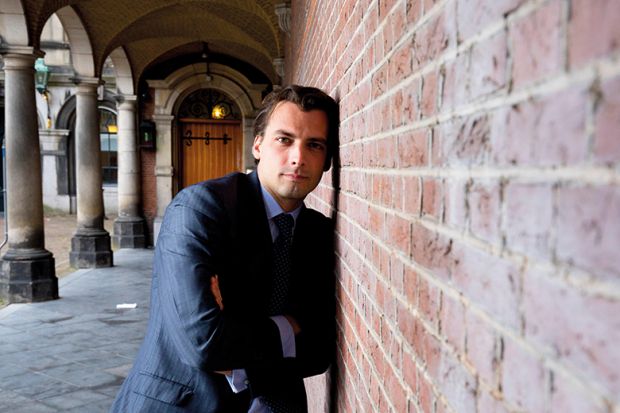The academic who led an anti-European Union populist party to a shock election win in the Netherlands and used his victory speech to attack universities for undermining “civilisation” based his movement on his Leiden University PhD thesis.
The success of the anti-immigration Forum for Democracy (FvD), led by 36-year-old Thierry Baudet, a former Leiden law lecturer, offers further evidence of how the rise of right-wing populism across the West is heralding an era of culture wars over free speech and supposed left-liberal “bias” in universities.
Some also regard Mr Baudet – who styles himself as an intellectual and defender of high culture, with a love of the piano and a hatred of contemporary architecture – as to some extent reaching beyond the traditional base of such parties, which has tended to be overwhelmingly non-graduate voters.
The FvD won the most votes in provincial elections held on 20 March for the Senate, the upper and less significant house of the Dutch Parliament, depriving the governing coalition of its majority (although, with a multiplicity of parties competing in the Netherlands, the FvD only won about 14.5 per cent of the vote).
The party, founded by Mr Baudet as a thinktank before it became a political party in 2016, traces its origins to his doctoral thesis at Leiden, published as a book in 2012 under the title The Significance of Borders: Why Representative Government and the Rule of Law Require Nation States.
The FvD is connected to a number of figures in Leiden’s law faculty. Paul Cliteur, professor of jurisprudence at Leiden, was co-supervisor of Mr Baudet’s thesis and was placed second on the party’s list of election candidates – meaning that he is now expected to become a member of the Senate.
Speaking to Times Higher Education in his office at Leiden, Professor Cliteur said: “Basically his [Mr Baudet’s] PhD dissertation became the cradle of a new political movement. All his ideas, the ideas of the party, are in that particular book.”
“The key idea of the thesis and also of the party is that you cannot throw away the nation state,” continued Professor Cliteur, who, as a conservative legal scholar and columnist known for attacks on multiculturalism, is a controversial figure himself.
“The second thing is what is threatening that nation state. Two things: from above, the EU; and bottom up, multiculturalism.”
In his election night speech, Mr Baudet said that “we stand…amid the debris of what was once the largest and most beautiful civilisation the world has ever known. We are destroyed by the people who should protect us.” He went on to say: “We are undermined by our universities, by our journalists, by the people who receive our art grants and who design our buildings.”
Asked what Mr Baudet meant, Professor Cliteur said: “Most universities do not honour diversity in the sense of ideological [diversity]…People interpret ‘diversity’ as difference in skin colour. But that is not what diversity is about. It should be viewpoint diversity.”
Ingrid van Engelshoven, the minister for education, culture and science, responded to Mr Baudet’s claim about universities, tweeting that it was “nasty”. The member of the centrist Democrats 66 party said: “Society is built on the work [and] knowledge of scientists [and] lecturers. We must protect academic freedom, not make it suspect.”
Later in the speech, Mr Baudet said that “people no longer believe in the Netherlands” or “in our language, which has…been abolished at our universities”. That was a reference to the long-running controversy over Dutch universities teaching some courses in English – a hot-button cultural identity issue for some on the right.
Asked why he thought that the FvD had achieved such success, Professor Cliteur said: “The people are looking for a new grand narrative, a cultural philosophy.”
后记
Print deadline: Dutch election victor’s university attack has origins in his PhD thesis




